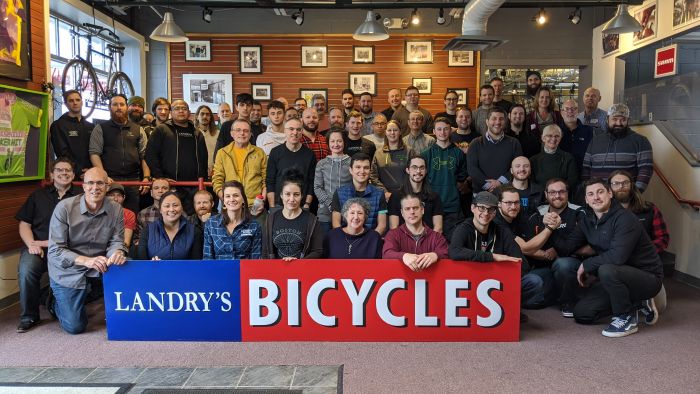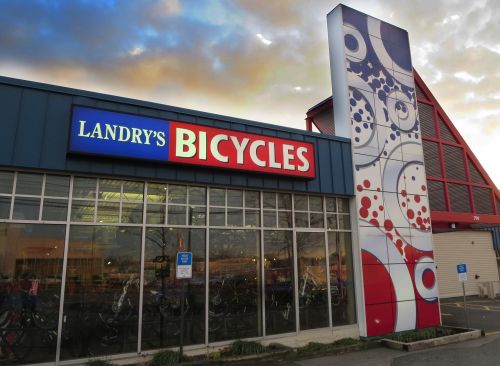BOSTON (BRAIN) — Mark Vautour doesn't get his coffee from Starbucks or dine at nearby Legal Seafood. When a Landry's Bicycles customer knocks on the door 10 minutes after closing, he'll open the door. That's what a neighborhood businessman does.
"More people know me as Mark from Landry's than Mark Vautour," he said. "It feels like part of my identity. I don't aspire to live in a world that's run by corporations. The things that are most important to me are the relationships I make along the way and the investment I have in my community."
While brands like Specialized, Trek, and Pon.Bike are buying more independent bike shops, Landry's Bicycles stands apart as an employee-owned retailer. In March, the shop, which turns 100 this year, announced that it grew its employee ownership to 100% through the sale of additional stock in its Employee Stock Ownership Plan (ESOP).
"A focused and curated selection of bikes is important and best for the consumer and business," said Vautour, who has been with Landry's for 25 years. "In my mind, a single brand is not the best solution. We've seen people overly enlarge their selection during the pandemic and pick up brands that don't represent them well. So having a focused selection allows you to run a better business for yourself and customers. The Apple store is successful as an Apple store, but there are an awful lot of Android users out there. And Budweiser sells an awful lot of beer, but put your favorite brew on the BRAIN survey, and I think you'll find that's not everybody's choice."
Landry's carries Specialized, Trek and Giant bikes, in addition to some niche bike brands. Landry's was one of the largest U.S. bike retailers on the Big BRAIN Top Ten list last year; since that article was published, two of the other large chains on the list have been acquired by a major supplier.
'Like family'
Peter Henry and his brother, Tom, owned Landry's since the 1970s before starting the transition to an ESOP structure in 2009. Peter said they were committed to an ESOP transition and the shop leadership was just as committed.
"We did not like any of the other options apparent at the time for selling the company when we retired, and as a personal choice, we wanted to make the option available to our employees. They were like family to us," said Peter, who serves as board chair of the National Bicycle Dealers Association.
Becoming employee owned takes time and is a highly regulated process with the Internal Revenue Service and the Department of Labor involved as mandated by the Employee Retirement Income Security Act and ESOP-specific legislation, Peter said.

"This means a lot of work for lawyers and other professionals, and cost and work for the company," he said. "There is a required annual valuation of the business — you can't just look up the price like a mutual fund — which costs about $10,000 per year. For a company big enough to take this expense in stride, it is worth it. We learned a lot about what creates value for an informed investor who wants nothing to do with actually running a bike shop. A lot of people who buy Microsoft stock want nothing to do with running a software company. Value is best built by having a leadership and management team that can run the company without participation by the soon-to-retire owners."
In working toward their goal, the Henry brothers had to develop an understanding of how they achieved success and convey that to others. "We had to allow them to make decisions that might not be the ones we would have made. Doing these things improves a business, even if retirement is not imminent."
When asked if they were ever approached by one of the big brands, Peter said, "The topic of selling has come up in conversations, but they never went far. The private owners were committed to the ESOP transition; the emerging leadership was just as committed."
Employees have important say-so
For Landry's to be sold now, Peter said ESOP beneficiaries have a right to vote their shares to approve or disapprove of any sale.
"If someone wanted to buy Landry's, no matter the offer price, it would still go to a vote of the employees."
"This means that no sale can take place without the prior knowledge of most employees. With most recent bike shop sales, the first anyone hears is that the shop has been sold. They say three people can keep a secret if one of them is dead; 100 people cannot keep a secret. With an ESOP company, the first public news would be that potential Buyer X is making an offer."
Peter said shares can only be sold back to the ESOP, and only in limited situation.
- Following retirement, ESOP will repurchase shares over five years.
- Following termination of employment for any other reason, shares will be repurchased beginning after five years, spread over an additional five years. (The plan is intended to benefit long-term employees.) Employees with small balances are paid out immediately, a common plan provision to avoid excessive administrative costs.
- Long-term employees over 55 may “diversify," selling back some of their shares with the proceeds going into their 401(k).
Vautour said the Henrys researched the process thoroughly because it was important they received a fair price. "It's an ESOP, not a co-op," Vautour said. "There's only so many ways to get out of your business. You can die and pass along your debts, so to speak. You can sell to the highest bidder, which you're seeing a lot of right now. You can liquidate and simply close your doors. The other thing you can do with your business is give it to your kid. They both had kids who weren't interested in running the business."
Peter's daughter, Jen, is still involved in the business as Landry's lead buyer. "And we wouldn't have made it through the pandemic without her," Vautour said.
For employees to be part of Landry's ESOP and accrue shares in any given year, Vautour said they have to be with the company more than a year, over the age of 21, and worked more than 1,000 hours in the past year. Shares are capped after a certain amount. ESOP is government regulated, with Landry's employing Spinnaker Trust that serves as a fiduciary to ensure the employees are operating in the company's best interests.
"Leadership, ownership, and management are still clearly delineated; there's still a CEO; there's still a CFO," Vautour said. "If someone wanted to buy Landry's, no matter the offer price, it would still go to a vote of the employees."
He said an independent valuator sets the share price yearly and noted, "If I have shares in IBM, there's nothing I can do to change the share value of IBM. But I can change the share value of Landry's by treating our customers better. And it's also about caring about things like you don't throw away a bottle of lube when there's half of it left. You turn the lights off when you leave. You treat it like it's your house."
That literal sense of ownership that permeates each employee is real, Vautour said, extending to considering customers and colleagues like family.
"You can imagine walking into a restaurant and having the owner treat you better than a high school kid," he said. "The idea is to really enrich that sense of value that owners care. And the community is better when restaurants are run by local ownership. There's pride. The love and care of serving our customers and each other. I'm staying late if my staff is staying late. I know it sounds kind of hokey. ..."
Not to David Billstrom. The CEO of Kitsbow Cycling Apparel outside of Asheville, North Carolina, became completely employee owned in January.
"We've already seen a change," Billstrom said last month after serving as a panelist on the topic of employee-owned businesses at the Clean Tech Summit at UNC Chapel Hill in North Carolina. "Employees are asking, 'Why are we spending money on that project, initiative, equipment' — where in the past, they would ask if they could please spend money on a project, initiative, equipment. It doesn't mean we don't spend money, but it means that everyone plays a role in financial responsibility. Just like some of the best brands consider every employee to be part of the customer service department.
"It is incredibly exciting to see truly local businesses retaining local ownership," Billstrom said.
Santa Fe, New Mexico-based distributor BTI also is employee owned. Rather than an ESOP, BTI is structured as an Employee Ownership Trust (EOT). BTI employees do not have equity in the company. Instead the equity is held as a trust and employees are eligible for profit sharing.


